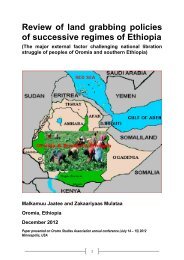freakonomics
freakonomics
freakonomics
You also want an ePaper? Increase the reach of your titles
YUMPU automatically turns print PDFs into web optimized ePapers that Google loves.
jackpot is now outweighed by each contestant’s desire to win the jackpot. It’s easier to do<br />
that if you eliminate the other good players. So, roughly speaking, the typical contestant<br />
will vote to eliminate the worse players in the early rounds and the better players in the<br />
later rounds.<br />
The key to measuring the Weakest Link voting data is to tease out a contestant’s playing<br />
ability from his race, gender, and age. If a young black man answers a lot of questions<br />
correctly but is voted off early, discrimination would seem to be a factor. Meanwhile, if<br />
an elderly white woman doesn’t answer a single question correctly and is still not voted<br />
off, some sort of discriminatory favoritism would seem to be at play.<br />
Again, keep in mind that all of this is happening on camera. A contestant knows that his<br />
friends, family, and co-workers are watching. So who, if anyone, is discriminated against<br />
on The Weakest Link?<br />
Not, as it turns out, blacks. An analysis of more than 160 episodes reveals that black<br />
contestants, in both the early and late rounds of the game, are eliminated at a rate<br />
commensurate with their trivia-answering abilities. The same is true for female<br />
contestants. In a way, neither of these findings is so surprising. Two of the most potent<br />
social campaigns of the past half-century were the civil rights movement and the feminist<br />
movement, which demonized discrimination against blacks and women, respectively.<br />
So perhaps, you say hopefully, discrimination was practically eradicated during the<br />
twentieth century, like polio.<br />
Or more likely, it has become so unfashionable to discriminate against certain groups that<br />
all but the most insensitive people take pains to at least appear fair-minded, at least in<br />
public. This hardly means that discrimination itself has ended—only that people are<br />
embarrassed to show it. How might you determine whether the lack of discrimination<br />
against blacks and women represents a true absence or just a charade? The answer can be<br />
found by looking at other groups that society doesn’t protect as well. Indeed, the Weakest<br />
Link voting data do indicate two kinds of contestants who are consistently discriminated<br />
against: the elderly and Hispanics.<br />
Among economists, there are two leading theories of discrimination. Interestingly,<br />
elderly Weakest Link contestants seem to suffer from one type, while Hispanics suffer<br />
the other. The first type is called taste-based discrimination, which means that one person<br />
discriminates simply because he prefers to not interact with a particular type of other<br />
person. In the second type, known as information-based discrimination, one person<br />
believes that another type of person has poor skills, and acts accordingly.<br />
On The Weakest Link, Hispanics suffer information-based discrimination. Other<br />
contestants seem to view the Hispanics as poor players, even when they are not. This<br />
perception translates into Hispanics’ being eliminated in the early rounds even if they are<br />
doing well and not being eliminated in the later rounds, when other contestants want to<br />
keep the Hispanics around to weaken the field.









